Leap! (or Ballerina): Unpacking the Animated Dance Dream
Ever puzzled by a movie with two names? Let's clarify "Leap!" It waltzed into our hearts, previously known in French as "Ballerina." It's the same joyful animated film. The title changed for its journey across the Atlantic.
Picture Paris in 1879. The city buzzes with creativity and new sights like the Eiffel Tower, still being built. This drama unfolds in "Leap!", where cobblestone streets meet the Opera Ballet School. History buffs, beware! While the setting shines, accuracy often gets sidetracked. Expect glimmers of 19th-century Paris and nods to the Statue of Liberty’s creation. However, don’t seek a documentary. Think of it like sweet, colorful cotton candy—delightful to see, not exactly factual. As the Denver Post remarked, perhaps the "tale of an aspiring ballerina lacks historical depth," aiming for heart over history.
Meet the Characters: Dreams and Drama on Pointe
Félicie: The Ballerina with Boundless Dreams
Félicie leads "Leap!" She is an eleven-year-old orphan, full of determination but lacking grace—initially. This protagonist doesn’t just wish for a stage; she dreams of being a prima ballerina. Paris in the 1870s is her arena, and the Opera Ballet School is her goal, even if she leaps before mastering the steps.
Victor: The Inventor with a Heart (and a Crush)
No dreamer journeys alone. Félicie's partner is Victor, her ally in escape. While she pursues pirouettes, Victor fixates on gears and gadgets. He wishes to become a legendary inventor, maybe rivaling Mr. Eiffel someday. He also has a crush on Félicie. That puppy love brings clumsiness and rivalry with another suitor, Rudolph. A fun tidbit: in the US version, Victor's voice changed! Nat Wolff replaced Dane DeHaan, giving Victor a distinct flavor.
Odette: Mother, Ballerina, Mystery
Odette, Félicie’s mother, carries an air of mystery. She, a ballerina, made the tough choice to leave Félicie at an orphanage when she was tiny. Why? It involved life's challenges and perhaps some backstory. Their reunion in Paris is touching yet tense. In a raw moment, Félicie snaps at Odette, denying their bond. This scene adds depth to their story.
Louis Merante: The Stern but Inspiring Instructor
No ballet story feels right without a strict instructor. "Leap!" offers Louis Merante, the tough-love teacher. He stresses ballet is more than rote movements. "It’s not enough to do the steps," he insists. Dance needs spirit and storytelling. Merante motivates his students, combining stern looks with genuine belief in their abilities.
Régine Le Haut: The Antagonist in Heels
No tale is complete without a villain. Régine Le Haut fills that role with poise and ambition. She presents the challenges Félicie must face to fulfill her dreams. Régine counters Félicie's earnest enthusiasm, embodying ambition gone awry. Think of her as the stage mom from ballet hell.
Romance: A Dash of Young Love
"Leap!" isn't mainly a romance, but romantic themes surface. Victor’s crush on Félicie adds a sweet subplot. Think of classic childhood crushes with awkward flirtation and comical competitiveness with Rudolph for Félicie’s affection. It remains lighthearted and charming, enhancing character dynamics.
Plot Twists and Triumphs: The Narrative Leaps
Mother's Motivation: A Sacrifice for Survival
Delving into Odette's past reveals her choice to leave Félicie was born from necessity, not coldness. The film hints at hard choices made for Félicie's survival. This revelation adds layers to Odette, making her more than absent parent.
The Grand Finale: Nutcracker Dreams Realized
The film's climax is heartwarming. Just as hope fades, Victor leaps into action, helping Félicie. In a dramatic chase, they evade Régine, who tries to derail their plans. But triumph awaits! The film's end sees Félicie shine in "The Nutcracker." The spotlight hits her as she fulfills her dream. Merante, Odette, and Victor beam with pride, completing arcs of mentorship, reconciliation, and support.
Statue of Liberty: A Green Giant in Progress
Eagle-eyed viewers will notice the Statue of Liberty sports its iconic green hue in "Leap!" This detail isn’t an error. By 1879, the statue was under construction and already displayed its oxidized copper. This subtle historical note connects animation to reality.
Behind the Scenes: Production Pirouettes
US Version Tweaks: From Ballerina to Leap!
The transition from "Ballerina" to "Leap!" involved significant changes. Guided by Harvey Weinstein, the film transformed for its American release. Voice cast changes stood out, but the core story stayed intact. The rebranding aimed to connect with American viewers more effectively. Discover more about the original film on its Wikipedia page.
Looking Ahead: Sequels and Sister Films
Leap 2: The Adventure Continues?
For fans of "Leap!", more may be coming. Rumors of a sequel titled "Leap 2: Rise of the Beast" suggest new adventures for Félicie. What challenges await? Will mythical creatures join the ballet world? Stay tuned for updates!
Leap Across Genres: Not Just One "Leap" in the Film World
Interestingly, "Leap!" isn't alone with that title. A 2020 Chinese sports drama, also called "Leap" (夺冠), features the national women's volleyball team. This "Leap" shares no connection but tells a distinct story. Specify which "Leap" you seek for animated ballet or sports drama!
A Glimpse into the Past: Historical Echoes
Statue of Liberty: Green with Age, Even Then
Let's revisit that green Statue of Liberty. It serves as a reminder of the film's late 19th-century backdrop. Copper oxidation adds historical reality to the animated world.
Paris in 1879: A City on the Cusp of Modernity
"Leap!" transports us to Paris during significant history. The 1870s marked change and innovation, visible in the Eiffel Tower's construction and the artistic movement. While the film bends historical accuracy for story, it charmingly captures Paris's essence.
Reviews from outlets like the Chicago Tribune indicate that while "Leap!" captivates, it occasionally stumbles in delivering a balanced blend of history and fantasy.













Responses (0 )